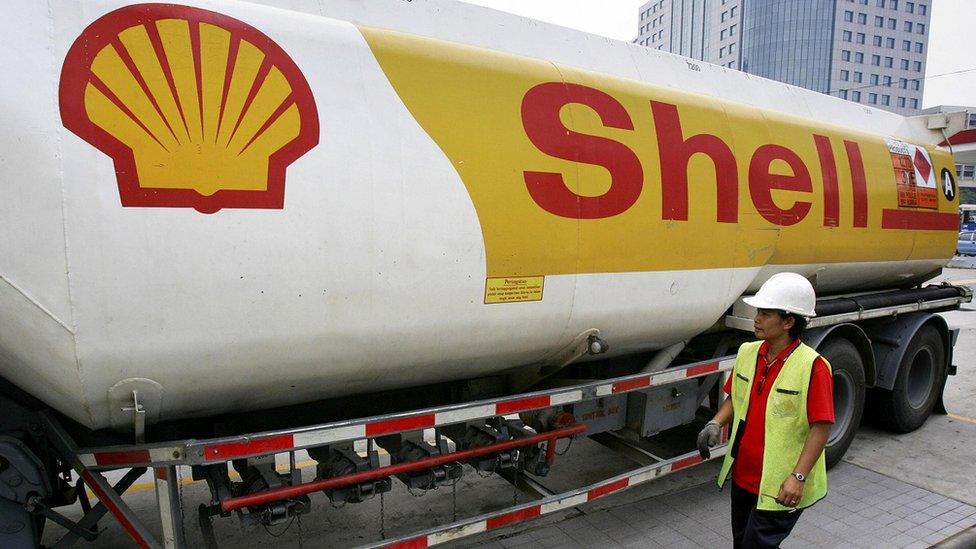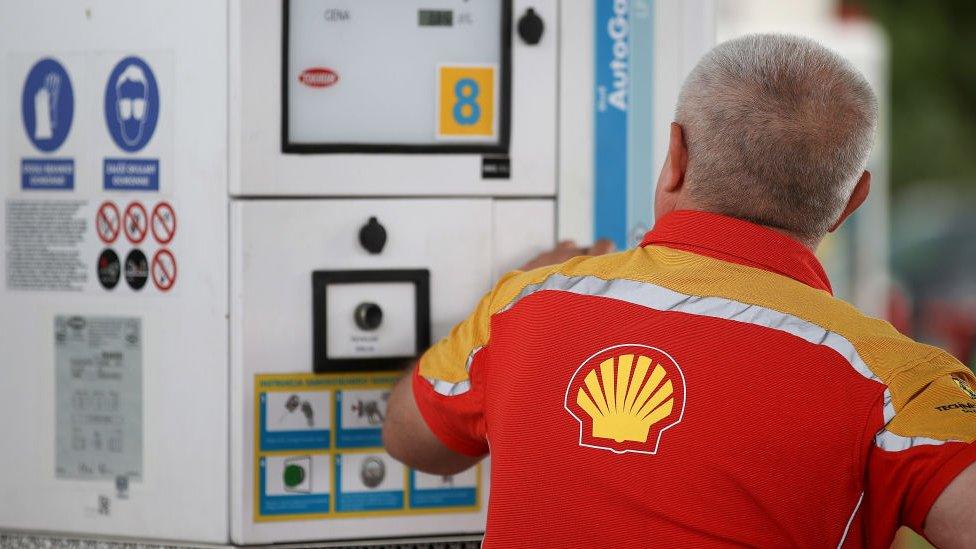Shell reports lower profits as energy prices cool
- Published
- comments

Oil and gas giant Shell has reported lower annual profits due to energy prices falling last year.
Profits were $28.2bn (£22.3bn) in 2023, down from $39.9bn in 2022 which was the company's highest earnings in its 115-year history.
Energy firms made record earnings when oil and gas prices soared in the aftermath of Russia's invasion of Ukraine amid fears of supply problems.
Households bills have eased since 2022, but remain at a high level.
The price of gas and electricity, as well as petrol and diesel, first began to climb after the end of Covid lockdowns, but surged in March 2022 after the outbreak of war in Ukraine due to concerns over supplies.
The price of Brent crude oil reached nearly $128 a barrel following the invasion, but has since fallen back and is currently at about $80. Gas prices also spiked but have come down from their highs.
The 2022 surge in prices led to all energy companies, including the likes of Shell and BP, to make bumper profits. In response, the government introduced a windfall tax - called the Energy Profits Levy, external - on the "extraordinary" earnings of firms on their UK operations to help fund a scheme to subsidise gas and electricity bills.
Shell confirmed it paid £178m in UK windfall tax for 2022. A company spokeswoman said the company paid £1.1bn in overall tax in the UK for 2023, of which £240m was taxed under the Energy Profits Levy.
Meanwhile, Shell said it returned $23bn to its shareholders in 2023, and was now increasing its dividend by 4% and beginning a $3.5bn share buyback programme over the next three months.
Shell said the fall in profit last year was a result of lower oil and gas prices, as well as lower volumes being traded and lower margins for refining, which is the process when crude oil, the raw material extracted from the earth, is made into products such as diesel.
It added 2023 saw higher liquefied natural gas (LNG) trading. Many European countries turned to LNG as an alternative source of energy after Russia cut its supplies of natural gas to continent.
As a result, the British company posted profits of $7.3bn in the final three months of 2023, which exceeded analysts' expectations but was down from a record $9.8bn in the same period the year before.
Jamie Maddock, energy analyst at wealth management business Quilter Cheviot, said Shell's strong results were driven by its gas division.
He warned that oil and gas prices were likely to remain "unpredictable" in 2024 with geopolitical tensions remaining high in the Middle East.
"It is these sorts of environments that energy giants can thrive in, as we saw in 2022, so it wouldn't be a shock to see Shell continuing to deliver over the course of the year," he added.
Jonathan Noronha-Gant, senior campaigner at Global Witness, accused Shell of "choosing climate-wrecking U-turns and shareholder pay-outs" as a result of its strong profits, rather than "investing in clean energy".
Wael Sawan, Shell's chief executive, said the company in 2024 would continue to "simplify our organisation with a focus on delivering more value with less emissions".
Related topics
- Published16 November 2022

- Published23 January 2024

- Published2 February 2023

